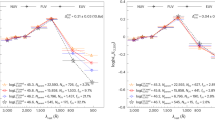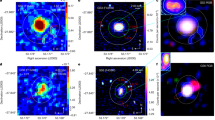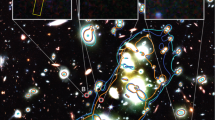Abstract
ACCORDING to Milne, the multitude of the distant galaxies form a continuous luminous background. It is interesting to investigate what its colour should be. By Hubble's law, the spectra of the galaxies are shifted towards the red. It is easy to calculate the integral colour of the background if we adopt Milne's view that the galaxies are really receding. Then the light of a galaxy is shifted towards the red according to Doppler's law. The intensity from a receding nebula is less than it would be if the nebula were motionless at the same distance. Indeed, a quantum of light if shifted to the red has less energy than the original quantum; in addition, when a source of light is receding, its quanta fall upon the observer less frequently than they would if the source were motionless. Under the combined action of both causes the intensity is diminished doubly.
This is a preview of subscription content, access via your institution
Access options
Subscribe to this journal
Receive 51 print issues and online access
$199.00 per year
only $3.90 per issue
Buy this article
- Purchase on Springer Link
- Instant access to full article PDF
Prices may be subject to local taxes which are calculated during checkout
Similar content being viewed by others
Author information
Authors and Affiliations
Rights and permissions
About this article
Cite this article
LEONTOVSKI, M. Colour of the Luminous Background of the Extra-Galactic Nebulæ. Nature 137, 904–905 (1936). https://doi.org/10.1038/137904b0
Published:
Issue Date:
DOI: https://doi.org/10.1038/137904b0
Comments
By submitting a comment you agree to abide by our Terms and Community Guidelines. If you find something abusive or that does not comply with our terms or guidelines please flag it as inappropriate.



